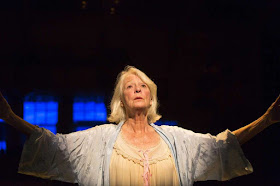NOTE: This is the first of what I expect to be several essays on topics that I should have been writing about on a regular basis, over the past several months.
Writing Madeline Kahn’s biography gave me the opportunity to meet, speak, and/or correspond with a number of people whose work I already admired — as well as coming to admire many of Madeline’s other colleagues, with whose work I had been unfamiliar. In the former category are of course great comedians such as Mel Brooks, Robert Klein, and Lily Tomlin, but also some Great American Actors who worked with Madeline onstage. In the past several months, I’ve seen both Jane Alexander and Kevin Kline return to the boards, offering welcome reminders that, no matter how they excel onscreen, they’re authentic theater animals.
Jane Alexander’s theater background helped me considerably the first time we spoke. When conducting a phone interview, I usually type while talking, transcribing the conversation immediately. Of all those interviews, only Jane Alexander did I trust to put on speaker phone: her diction is so flawless that, even over my crummy cell phone, every word rang clear. Over the course of her career, she’s performed in more than 100 plays (according to her bio in the playbill), so when I heard that she was rehearsing a new play at the Long Wharf in New Haven, I determined to go — little realizing that the play, Matthew Barber’s Fireflies — is set in South Texas, about 30 miles from my mother’s hometown.
I felt as if I were eavesdropping on the neighbors. Based on Annette Sanford’s novel Eleanor & Abel, Fireflies is a slight, sweet tale of a retired schoolteacher taking a late-in-life chance on love. The object of her affection is unlikely, and indeed she finds herself doing all sorts of things that don’t conform to her pre-existing patterns of behavior — even while she is true to herself, perhaps for the first time.
If the play struck me as having more resonance than it actually possesses or deserves, that may be because I saw it at a matinée, where, as the woman sitting next to me observed, I was probably the youngest person in the room. For the people around me, the play’s message — it’s never too late — was as meaningful as it was welcome. And as Jane Alexander flaunted her lustrous silver mane and her character repeatedly told us she’d begun using a new hair product that made her look so good, I contemplated my own grizzled locks and wondered where in the hell I could buy such a product. I’m sure I wasn’t alone.
Fireflies called upon both the character and the actress who played her to take chances and to reach beyond our expectations. When discussing Madeline Kahn’s performance opposite her in Wendy Wasserstein’s The Sisters Rosensweig, Jane Alexander remarked to me that she’s better known as a serious dramatic actress than as a comedian. One can excuse the people who cast her: when an actress is capable of her kind of command and authority, why wouldn’t you take advantage of that? She’s done more than 100 plays, according to her program bio, so I can’t with any certainty claim that she’s never played scenes of such broad comedy. But I’ve never seen her do anything like what she did in Fireflies. I came to the Long Wharf expecting a reminder of her mastery of the stage, but what I got was a revelation.
At the very least, Fireflies represented a change of pace for her. With the incomparable Judith Ivey playing Eleanor’s neighbor and best friend, the play at times approached the style of a more realistic, grounded I Love Lucy — kitchen-sink zaniness, if you will. Yet stage director Gordon Edelstein also incorporated elements of fantasy (dinosaurs, planetariums) and maintained the play’s emotional foundations with great skill, and he knew how to make certain that every audience member walked out with the lasting image of Jane Alexander dancing in her nightgown. I’ve never seen her lovelier than she was here.
In the Long Wharf lobby, paperback copies of Alexander’s most recent book were on sale, and I bought one — having already shared my hardback copies with friends. Wild Things, Wild Places is unlike any actress’ memoir that came before it, an account of Alexander’s many trips around the world to conduct field research in conservation. She has been doing this without fanfare for more than 30 years. I confess that, when I first saw that she described herself as an “environmental activist,” I originally supposed that she’d signed a few petitions and attended a rally or two. I should have known better.
Of course Alexander engages — actively — in her environmental concerns, just as she committed, body and soul, to her political and arts activism by accepting the (phenomenally difficult) job of chairman of the National Endowment for the Arts during the Clinton administration, as well as by taking on roles in projects such as Testament and Playing for Time. Now I found herself wondering, when she imitated a dinosaur in Fireflies, which wilderness creatures inspired her performance.
The British make it so much easier than the Americans do to identify their Great Actors: the Queen has an honors list, after all, to recognize her subjects for their service to art and society. All we can do is remind one another that Jane Alexander is one of the greatest actors this country has ever produced.

It’s a lucky name for her: Alexander as Eleanor (Roosevelt), with Edward Herrmann as FDR.
This was my first glimpse of her, and I’ve admired her ever since.





